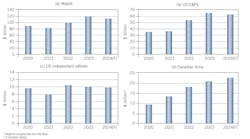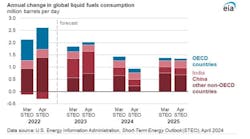US President Donald Trump ordered the US Environmental Protection Agency to waive volatility limits for gasoline with a 15% blend, facilitating its year-round sale in the country. Agricultural and ethanol interests applauded the Oct. 9 move, while the oil and gas industry and environmental organizations strongly condemned it.
“Today, we are unleashing the power of E15 to fuel our country all year long. Promises made, promises kept,” Bloomberg News reported the president saying at an evening rally in Council Bluffs, Iowa, where he campaigned for Gov. Kim Reynolds and other Iowa Republicans facing reelection.
“So we’re heading out to Iowa, where we have a big statement to make, as you know, on ethanol and for our farmers,” Trump said as he left the White House that morning before flying to Iowa. “Likewise, we’re taking care of our refineries and our refiners, and they’ve done a fantastic job. But we want to get more fuel into the system, and this is a great thing.”
Ethanol interests have complained that Reid Vapor Pressure gasoline volatility limits required under federal law have damaged the domestic renewable fuels market. “Securing fair market access for E15 and other higher blends has been our top regulatory priority for several years, and we are pleased that the first official step in this process is being taken. When markets are open and competitive, American consumers win,” Renewable Fuels Association Pres. Geoff Cooper said.
American Petroleum Institute Pres. Mike Sommers felt otherwise. So did American Fuel & Petrochemical Manufacturers Pres. Chet Thompson.
“Putting a fuel into the marketplace that the vast majority of cars on the road were not designed to use is not in the best interest of consumers,” said Sommers. “Vehicle compatibility tests have shown that high ethanol levels in gasoline can damage engines and fuel systems. EPA has previously stated that it does not have the legal authority to grant the E15 waiver, and we agree with that assessment. The industry plans to aggressively pursue all available legal remedies against this waiver.”
Thompson said, “The president’s proposal to waive the rules for E15 is unlawful and could actually make the problems of the Renewable Fuel Standard worse. [He] has promised to broker a deal to reform the RFS that works for all stakeholders. This isn’t it.”
Other trade association leaders also were critical. “In addition to being legally dubious, this action will put millions of American consumers at a greater risk of misfueling, so a small, politically important group can benefit,” National Marine Manufacturers Association Pres. Thom Dammrich said.
“While today’s announcement is not surprising, the overwhelming opposition to expanding E15 sales—which includes various business, energy, and environmental organizations—is striking,” Dammrich said. “When such strange bedfellows are aligned against a course of action, leaders would be wise to reevaluate their position.”
The Fueling American Jobs Coalition—a Philadelphia area group representing organized labor, independent refiners, and gasoline retailers—said in a statement that Trump missed an opportunity to help both farmers and merchant refiners.
“We do appreciate the president’s recognition of the need for market reforms that could, if done right, reduce the role of market manipulation and speculation in the trading of RFS compliance credits known as [Renewable Identification Numbers]. These are goals that should be supported by all RFS stakeholders,” it said.
Contact Nick Snow at [email protected].

